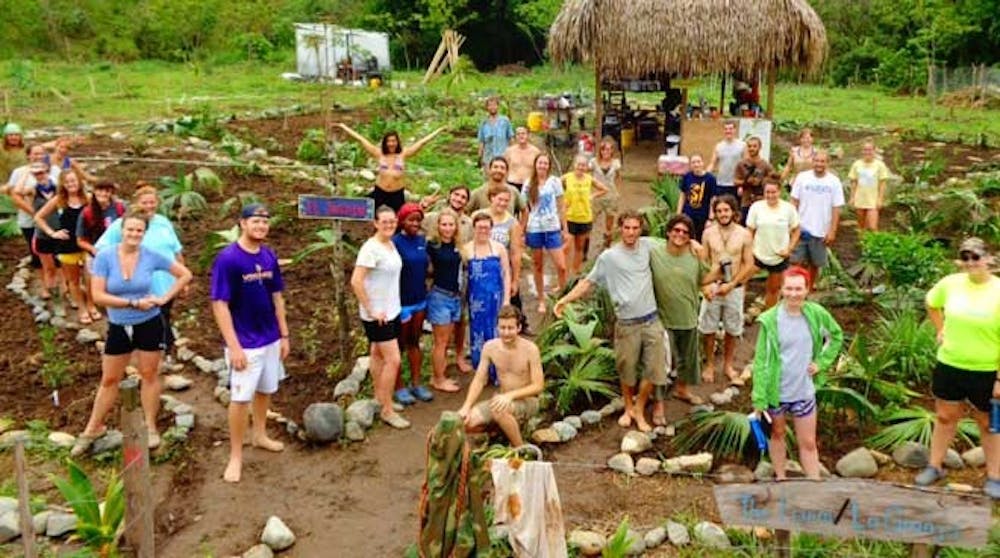For 77 days this summer, senior Lyniesha Wright lived without electricity, plumbing or even an alarm clock in the Kalu Yala Valley in the Panamanian highlands.
Wright was in a study abroad and entrepreneurial internship program with the Kalu Yala company, which is working to build a sustainable community from the ground up on the 550 acres of land it owns in the valley. Wright lived and worked there along with 30 other interns and seven directors.
"Programs take place in three venues: creating the town's foundation in Kalu Yala, creating relationships in the neighboring town of San Miguel and working on business logistics in Panama City," Kate Stewart, president of Kalu Yala's study abroad and internship program, wrote in an email from Panama.
Wright is a chemistry major with minors in education and anthropology. She learned about the Kalu Yala program through the anthropology department, since it is not one of University of Richmond's affiliated study abroad programs. Wright said she had been drawn to the program mostly because of how much it would put her out of her comfort zone.
"I wanted to do something that would calm me down, slow me down, where time was not an issue," she said. "There was no such thing as time there, because it didn't matter."
The interns in the valley, which is an hour-and-a-half hike from the rural village of San Miguel, were focused on biology, agriculture, animal science and outdoor recreation, Stewart said. Most of Wright's time was spent working on a water-testing project. Everyone living in the valley drinks the water from the river, but it had never been officially tested.
Because of the valley's altitude, Wright said they had known the water was somewhat pure, but no one had known what was in it. Wright and a couple other interns tested the water for five weeks and found that there was E. coli and fecal chloroforms in the water.
"That's not bad in itself," Wright said, "because E. coli just tends to give you stomach issues. But the problem is, E. coli is an indicator bacteria, which means if that's in the water, the chances of other things being in the water is much higher."
The process of testing the water, the results and the methods of treating the water were also important for the people of San Miguel, since the river is their town's main water source, she said.
Wright said she enjoyed her project and seeing things she had learned in the classroom applied to the real world. Although she is still not sure what she wants to do after she graduates in May, Wright is now more interested in how water systems work and how to make them sustainable. She is considering pursuing that in graduate school.
The valley lifestyle--going to sleep when the sun set and waking up when the sun rose, the lack of a tight schedule and being without the Internet or a cell phone--was a bit of a transition for Wright, but she said that lifestyle felt natural to her. It was the adjustment of coming back to her American life, and specifically Richmond life, that has been more difficult.
"When I came back home, people were texting me, expecting me to respond," she said, "and I don't necessarily want to respond right now, because I'm too busy engaging in [my present activity].
Enjoy what you're reading?
Signup for our newsletter
"I kind of like not having the obligation in something that's not there. When I was in Panama, everything that I was engaged in was there with me. So I was absorbed in where I was, whereas when I have my phone, I'm always somewhere else."
Wright said she would definitely recommend the whole Kalu Yala program to any Richmond student because there are so many different aspects to it, but she said she would especially want people to go to the valley.
"It's hard, but it's good," she said. "I would recommend it to anyone who likes the outdoors, anyone who's willing to get down and dirty and who's willing to work."
Contact reporter Maggie Burch at maggie.burch@richmond.edu
Support independent student media
You can make a tax-deductible donation by clicking the button below, which takes you to our secure PayPal account. The page is set up to receive contributions in whatever amount you designate. We look forward to using the money we raise to further our mission of providing honest and accurate information to students, faculty, staff, alumni and others in the general public.
Donate Now



